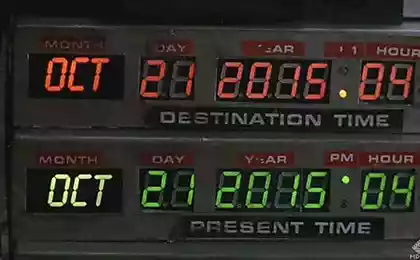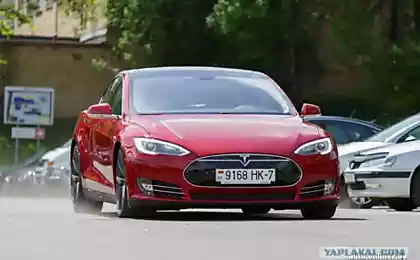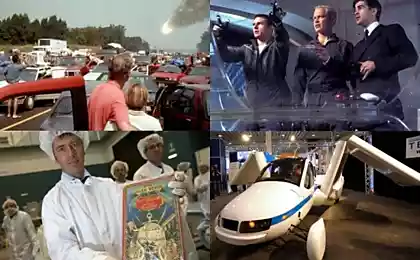1469
The future is here or how we perceive progress: on the 5th anniversary of one pessimistic fast
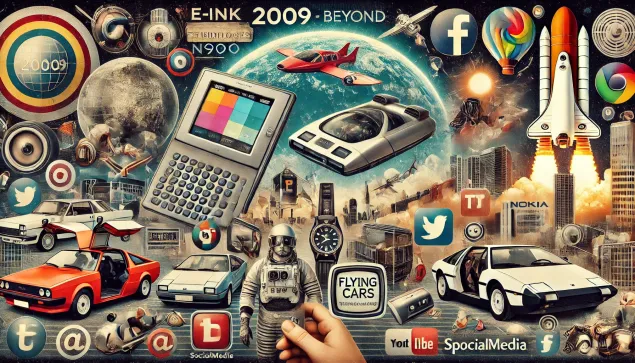
I stumbled upon one popular post at the time, which is just 5 years old: “The future is not here or what stops progress.” The content of this post is particularly interesting right now, as a revealing slice of the community’s thinking as of the end of the last decade, which can be compared to today and analyzed – why users thought so, what they did not notice and, most importantly, what conclusions we can draw about our current perception of the future and progress.
So it's 2009, and very few people know how to spell it in Italian. The iPad hasn't even been announced yet. The global economic crisis continues (although the bottom is already past), and in addition to it, the swine flu. Netbooks are still sold in full swing, they actively give out and beg for invites on Google Wave, among smartphones geeks especially revere the Nokia N900 and few people can come to mind that not only the Maemo project, but also the whole of Nokia will soon turn up. The green robot is already battling the apple for the market, and the concept of a smartphone as an app store platform has already loomed, but few people realize how devastating it will be for an established mobile zoo. The Internet and IT in general are quite developed, social networks are winning the general public along with games about farmers - the hottest topic at the time - but nobody likes anyone. No one knows about birds with pigs. Moreover, things like crowdfunding, “smart watches”, fitness trackers and health services, MOOCs and other educational movements are still practically unknown. Something somewhere heard about SpaceX, in general, “private space”, “Internet of things”, Tesla (still in doubt), 3D printers, neural interfaces, and the mention of “smart home” on the hub can still grab a minus. From everywhere sound mantras “modernization” and “rose forward”, and along with the hub is gaining popularity Trendclub with a watch from the movie “Back to the Future”, although its popularity without sponsorship will not be very long. I hope a lot of people remember this crazy time.
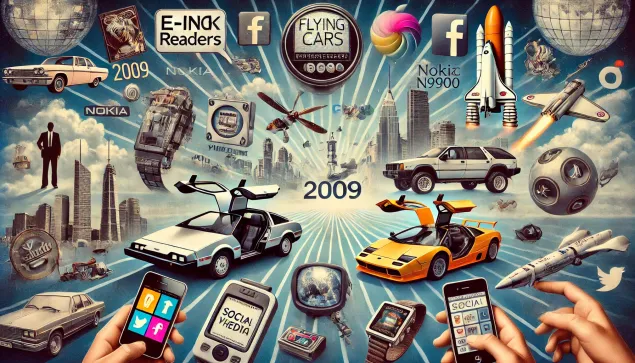
And so the Garyan habrauser comes up with pessimistic thoughts that everything is sad, because, you know, we still do not put connectors in our heads and do not drive flying cars, and not because progress has not yet reached this point, but allegedly because we are all terrible conservatives, we are afraid of the new and do not want to master it, and therefore, they say, are doomed to crawl on the ground for a long time and all that. In general, these thoughts are not unique in themselves, more interesting are the examples that the author illustrates in 2009:
1) The so-called Moller Skycar flying car. To my surprise, I found myself reading about it for the first time not on a membrane, but in Why? #7 in 1991, only to forget about it. Moller in the process is trying to put his brainchild "on the wing" for 40 years, and so far it is not very, although PR is prohibitive. The author of the post for some reason decided that people stupidly do not want to buy workable flying cars for a penny of $ 60k because of their conservatism.
2) OCZ NIA - remember that one? One of the first simple neural interfaces, still quite buggy. And not particularly popular a year after the release - which gives another +1 to the pessimism of the author. Later, Emotiv EPOC, NeuroSky – more interesting toys for geeks, although now, after 5 years, they have not yet become something as everyday as a mouse. Many people have probably heard of it or even held it in their hands. In short, this technology is still at a very early stage of consumer adoption and it is far from the “inflection point”.
(3) Video communication – in this case in mobile phones (including smartphones with 1 and 2 Android). Namely, its low popularity compared to conventional voice or text mobile communication. Like, science fiction invented how people will regularly communicate on videophones, and people, bitches, conservatives – do not want.
What can I say to that? Even in 2009, I looked at this phenomenon in the opposite way: it’s not people who remain conservative, but vice versa – it’s the science fiction writers of the past who had a limited vision of the future, because they built on their then values and needs. From our point of view, this is not the future, but just a funny, not very well-adjusted extrapolation of the past. When this misalignment begins to catch the eye, the “future” turns into retro, albeit futurism.
Next, the author gives two more particularly amusing examples by current standards:
(4) Readers with e-ink screens (which in the pre-tablet era essentially personified the transition from paper books to electronic books) - it turns out that one glamorous site in those days conducted a survey and a significant part of users with great skepticism spoke about the idea of buying such a device. But this is according to the survey, and what happened in reality, we all see in the tablet market and the trend towards an increase in phone screens. And although paper books are still in the honor of hipsters, the prospects of electronic books are no longer in doubt.
This example shows that conservatism exists mainly in the minds and tends to evaporate with the practical mastery of certain technologies.
(5) Touch screen (in this case, the author mentioned it casually on the example of tables like Surface – remember when this word was associated exclusively with expensive, cumbersome and cool solutions, and not with expensive, but stupid tablets for WinRT?). Let me remind you that tablets as such did not yet exist. By the way, even after the announcement of the first iPad on the same hub there were fierce debates, who needs it at all and why:
So, who are the conservatives in this case?
I'm going to show you why I think there's more conservatism in retrofuturistic templates (i.e., the idea that the future is flying cars, videophones, 3D and all that) than in real people's desire for convenience and practical solutions, and that Future 2.0 is not much like Future 1.0 makes it any less of a future.
Have you ever wondered why, around the middle of the 20th century, the future began to en masse to imagine this way? That cars will fly, phones will show an image, and colored and preferably three-dimensional, food will be in tablets (although this refers to slightly earlier attempts at predictions), and so on? At the same time, few science fiction writers paid attention to IT and mobile communication. Even advanced futurists very rarely described anything like our current Internet, and it was like a giant media library of content already created by someone, but they could not imagine anything like our social networks and what was happening in them.
The reason is that all these visions of the future were essentially an extrapolation of the needs of people with psychology at the time who had some experience using certain technologies. This is most conveniently explained by the example of a video phone.
For a person of the past, the phone was still a rather rare, expensive and not very convenient opportunity to contact another person (especially from another city or country), especially when viewed from our time. Today, we can do that wherever we are, as long as we have mobile connectivity. But the man of the 20th century, in principle, such experience was absent. There were only two types of communication for him:
1) real. One must physically approach a person, address them appropriately, and talk (in European culture, usually looking them in the eye rather than elsewhere). From the idea to the actual contact will take some time, depending on where the person is.
2) telephone. You need to physically approach the phone and wait for the connection. Again, it can take time before contact - the person may be absent from where the phone is.
That is, in any case, to communicate you had to go somewhere and spend time, sometimes money. At the same time, in reality, such a costly contact was often more productive, primarily due to visual capabilities. The whole human culture was originally focused on such a complex resource-intensive communication with nonverbals. When the phone came along, it seemed squalid and uncomfortable. But uncomfortable not because you can not carry it with you, but because the interlocutor is not visible! Because the experience of mobile communication was absent in principle, and the experience of “full contact”, on the contrary, dominated! And when the experience of remote, but only voice communication was added to this experience, the futurists in their dreams wanted to combine it - that is, to make contact both complete and remote!
It did not even occur to them that in practice, with the development of telephone communication, it will less and less be perceived as a surrogate of “full contact”, and will begin to form its own culture of voice communication, and especially with the transition to mobility – first in the form of radio tubes, then full-fledged cellular – this culture will increasingly distance itself from the “real”, this asynchronous, silent and therefore convenient form of communication, like SMS (albeit the most expensive in terms of byte!), and by the time when technology will make video communication possible, this culture will occupy a large part of mobile and text, as it will occupy a large part of the text. And most importantly, it will be comfortable for us in the 21st century.
In principle, they could be understood. Try to imagine a world where everyone has the opportunity to instantly start a telepathy session at the level of thought streams at high speed. For example, when programmers discuss the architecture of software, how quickly ideas can be exchanged and developed. And that in this world, people are taking advantage of this opportunity left and right in ways that may shock us. For example, broadcast what is happening in their head during sex in the network for money (or for free, and the money is taken for two-way communication.) Or not for money, but for likes or some other exotic services that look crazy from our point of view. In short, this is what our world of mobile, broadband, social media and Skype would have looked like in the past. Imagine the intellectual effort it took to even imagine such a world in those years. Not to mention that fiction of this kind would be difficult to perceive, boring, unpopular, or insulting to the “traditional values” of those years. It's much easier to imagine a videophone or fax on every corner: "McFly, you are freed!"
Who's the conservative? A 14-year-old lizard Vekashnitsa who sends 90 SMS a day, calls 9 dudes and undresses in Skype for webmoney before another, or rather someone who thought that she would be exclusively on a stationary videophone to discuss homework?:
Future 1.0 is about what we wanted yesterday.
Future 2.0 is about what we want tomorrow. It's harder to imagine, but it has much more to do with the real tomorrow.
Forecasting the future in understanding 2.0 can be those who can abstract from today’s and yesterday’s needs and not perceive them as if they will always be. I disagree with a 2009 author who argued that the future is made by needs that existed in the past. Although at the most basic level they can be reduced to one of several general categories (or even two, for example, “material” and “immaterial”), in this case it is important what form their evolution will take. Will the need for communication manifest itself in the form of “full contact” or through separate channels of text and voice; what needs will be met in the future by neural interfaces, 3D printing, crowdfunding or the same flying cars?
The example of conservatism of science fiction and futurologists of the past in relation to videophone and mobile communication is not the only one. Even more revealing is the evolution of life expectancy and human reproductive behavior in science fiction, socioeconomic and just relationships, and how these things were often presented by 20th century writers.
It would seem that the task of science fiction is to explore a variety of scenarios for the development of technology as radically as you like. In NF works, people fly on a wide variety of ships between stars and galaxies, travel through time, through alternative dimensions, etc., encounter any exotic distortions of physics. But they behave as if they were chronically stuck in the 1950s. In Western fiction, this includes socioeconomic relations, in Soviet they evolve towards communism, but deeper psychology remains the same. Perhaps only Lem managed to accelerate the fantastic imagination to something more interesting, although he is a man of his time.
In particular, for all the inclination to describe the arbitrarily intricate expansion of mankind in space, science fiction writers of the 20th century for some reason with great reluctance describe such a banal direction as the increase in life expectancy. They often have immortal or very long-lived characters are hostile or “alien” in nature, often emphatically opposed to “ordinary” people. The same applies to modified humans, mutants, cyborgs, people with enhanced intelligence, etc. If a science fiction writer is constructive in some aspect, others either criticize or ignore it. As for futurists-visionaries, an illustrative example described by one of the most radical futurists of the last century FM-2030 - when he at a conference of the same selected futurists-radicals somewhere in the 1960s asked which of them would like to live many times longer, then raised a few single hands. However, by the 80s there were already more of them (in the corresponding circles). Well, in fiction, only recently, in the 21st century, began to appear works in which over-longevity and other significant human changes are presented in a constructive manner, and not necessarily in a “mentor” way, when more advanced ultimatum drag the laggards behind, but more comprehensively. I have some ideas as to why this is happening now, but this is a separate topic.
In the same topic, we conclude that there are probably some predictable bugs in the perception of the expected future by most people, tied to their current lifestyle, practical experience, biological, social and technological realities that direct their thoughts about the future in one direction (video, 3D), while reality moves over time in others (mobile communication, SMS). And that it is possible in principle to anticipate this reality to a greater extent than most people, if you can abstract, think in a complex way, and identify the sources of current needs and potential drivers of their evolution. And what about deep space and ultra-longevity, I will tell you next time.
In conclusion, I recommend re-reading the comments of 5 years ago (preferably in the mobile version, UFOs are not closed there:) and be surprised by the pessimism of the community and mass misconceptions (compared to today), and at the same time remember how much new we have in these 5 years.
See you in the future!


